
Catalog excerpts
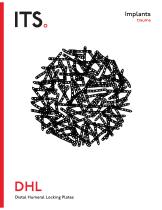
Implants trauma Distal Humeral Locking Plates
Open the catalog to page 1
CAUTION: Federal Law (USA) restricts this device to sale by or on the order of a board certified physician. WARNING: If there is no sufficient bone healing, wrong or incomplete postoperative care, plate might break. All ITS plates are preformed anatomically as a matter of principle. If adjustment of the plate to the shape of the bone is required, this is possible by carefully bending gently in one direction once. Particular care is required when bending in the region of a plate hole, as deformation of the plate may lead to a failure of the locking mechanism. The plate must not be buckled or...
Open the catalog to page 2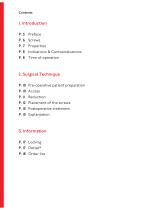
1. Introduction P. 5 Preface P. 6 Screws P. 7 Properties P. 8 Indications & Contraindications P. 8 Time of operation 2. Surgical Technique P. 10 Pre-operative patient preparation P. 10 Access P. 11 Reduction P. 12 Placement of the screws P. 15 Postoperative treatment P. 15 Explantation 3. Information P. 17 Locking P. 17 Dotize® P. 18 Order list
Open the catalog to page 3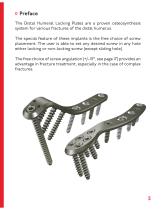
Preface The Distal Humeral Locking Plates are a proven osteosynthesis system for various fractures of the distal humerus. The special feature of these implants is the free choice of screw placement. The user is able to set any desired screw in any hole either locking or non-locking screw (except sliding hole). The free choice of screw angulation (+/- 15°, see page 17) provides an advantage in fracture treatment, especially in the case of complex fractures.
Open the catalog to page 5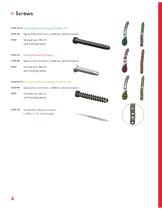
Cortical Screw, locking, D=3.5mm, SH Spiral Drill, D=2.7mm, L=100mm, AO Connector Screwdriver, WS 2.5, self-holding sleeve Spiral Drill, D=2.7mm, L=100mm, AO Connector Screwdriver, WS 2.5, self-holding sleeve Cancellous Screw, locking, D=4.2mm, SH Spiral Drill, D=2.5mm, L=180mm, AO Connector Screwdriver, WS 2.5, self-holding sleeve Guide Wire, Steel, D=1.6mm, L=150mm, TR, with thread
Open the catalog to page 6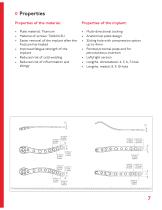
Properties Properties of the implant: • Plate material: Titanium • Material of screws: TiAl6V4 ELI • Easier removal of the implant after the fracture has healed • Improved fatigue strength of the implant • Reduced risk of cold welding • Reduced risk of inflammation and allergy • Multi-directional locking • Anatomical plate design • Sliding hole with compression option up to 4mm • Pointed proximal plate end for percutaneous insertion • Left/right version • Lengths, dorsolateral: 4, 5, 6, 7-hole • Lengths, medial: 8, 9, 10-hole
Open the catalog to page 7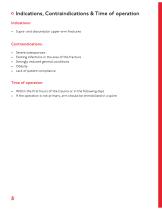
♦ Supra- and diacondylar upper-arm fractures Contraindications: ♦ Severe osteoporosis ♦ Existing infections in the area of the fracture ♦ Strongly reduced general conditions • Obesity ♦ Lack of patient compliance Time of operation: ♦ Within the first hours of the trauma or in the following days ♦ If the operation is not primary, arm should be immobilized in a splint
Open the catalog to page 8
Surgical Technique
Open the catalog to page 9
♦ General or regional anaesthesia or combination can be used • Tourniquet ♦ Prone position o Access Posterior approach: ♦ Median incision in the ulnar rim on the distal upper arm above the olecranon • Exposure and retraction of the ulnar nerve • Depending on the type of fracture, olecranon osteotomy and retraction of the triceps • In the case of supracondylar fractures, it is possible to approach from the ulnar and radial side adjacent to the brachial triceps tendon
Open the catalog to page 10
Reduction • Temporary fixation of the plate using guide wires • Anatomical reduction of the fracture segments to the plate • Subsequent control under fluoroscopy Optionally, the plate can be stabilized using the ITS. Temporary Plate Holder (58164-150).
Open the catalog to page 11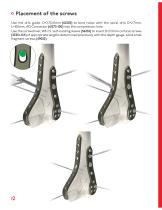
Placement of the screws Use the drill guide, D=2.7/2.0mm (62202) to bore holes with the spiral drill D=2.7mm, L=100mm, AO Connector (61273-100) into the compression hole. Use the screwdriver, WS 2.5, self-holding sleeve (56252) to insert D=3.5mm cortical screws (32351-XX) of appropriate lengths determined previously with the depth gauge, solid small fragment screws (59022).
Open the catalog to page 12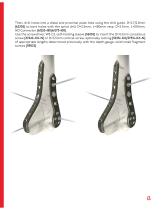
Then, drill holes into a distal and proximal plate hole using the drill guide, D=2.7/2.0mm (62202) to bore holes with the spiral drill D=2.5mm, L=180mm resp. D=2.7mm, L=100mm, AO Connector (61253-180/61273-100). Use the screwdriver, WS 2.5, self-holding sleeve (56252) to insert the D=4.2mm cancellous screw (37422-XX-N) or D=3.5mm cortical screw, optionally locking (32351-XX/37351-XX-N) of appropriate lengths determined previously with the depth gauge, solid small fragment screws (59022).
Open the catalog to page 13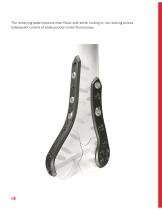
The remaining plate holes are then filled, with either locking or non-locking screws. Subsequent control of plate position under fluoroscopy.
Open the catalog to page 14
Postoperative treatment • Physical therapy • In case of poor bone quality or insecure fixation, movement fixator for a maximum of 6 weeks or upper-arm plaster cast for a maximum of 3 weeks • When a locking screw connection has been used, it is necessary to be aware that the diagnosis of non-union may be very delayed. Explantation If desired by the patient, the implant can be removed Removal should be performed at the earliest 6 months - 1 1/2 years later or after radiographic verification of the healed bone. The problem of cold welding was resolved by using a special surface treatment (for...
Open the catalog to page 15
o Locking Locking works because of: ♦ Screw material (TiALV) is slightly harder than plate material (Titanium Grade 2) • Screw head forms thread into the plate (no cutting) Benefits: • ± 15° and Locking • No pre threading • No cold welding • No debris • You can re-set the screw up to 3 times Dotize Type II anodization • Layer thickness 60-200nm Different colors + Film becomes an interstitial part of the titanium Implant surface remains sensitive to: Chipping - No visible cosmetic effect Peeling Discoloration Anodization Type II leads to following benefits* • Oxygen and silicon...
Open the catalog to page 17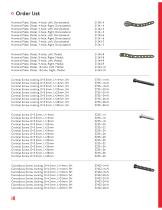
Humeral Plate, Distal, 4-hole, Left, Dorsolateral Humeral Plate, Distal, 4-hole, Right, Dorsolateral Humeral Plate, Distal, 5-hole, Left, Dorsolateral Humeral Plate, Distal, 5-hole, Right, Dorsolateral Humeral Plate, Distal, 6-hole, Left, Dorsolateral Humeral Plate, Distal, 6-hole, Right, Dorsolateral Humeral Plate, Distal, 7-hole, Left, Dorsolateral Humeral Plate, Distal, 7-hole, Right, Dorsolateral Humeral Plate, Distal, 8-hole, Left, Medial Humeral Plate, Distal, 8-hole, Right, Medial Humeral Plate, Distal, 9-hole, Left, Medial Humeral Plate, Distal, 9-hole, Right, Medial Humeral Plate,...
Open the catalog to page 18All I.T.S. catalogs and technical brochures
-
ufs
1 Pages
-
DHL
2 Pages
-
ITS
2 Pages
-
PHL
24 Pages
-
ACLS
20 Pages
-
CFN
32 Pages
-
OLS
24 Pages
-
PHLs
20 Pages
-
CTN - Cannulated Tibia Nail
28 Pages
-
SR Sacral Rods
20 Pages
-
HCS
24 Pages
-
TOS Twist-Off Screw
20 Pages
-
TLS
20 Pages
-
PRS-RX
32 Pages
-
HLS
20 Pages
-
ES
20 Pages
-
SR
20 Pages
-
FL
24 Pages
-
PL - Pilon Locking Plate small
12 Pages
-
OL - Olecranon Locking Plate
24 Pages
-
CAS
40 Pages
-
FCN
20 Pages
-
HOL
24 Pages
-
FLS
24 Pages
-
PFL
20 Pages
-
DTL
24 Pages
-
HTO
24 Pages
-
PTL
32 Pages
-
DFL
32 Pages
-
SCL
32 Pages
-
SLS
24 Pages
-
CAL
20 Pages
-
DUL
24 Pages
-
CLS
28 Pages



























































